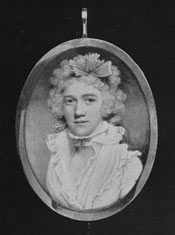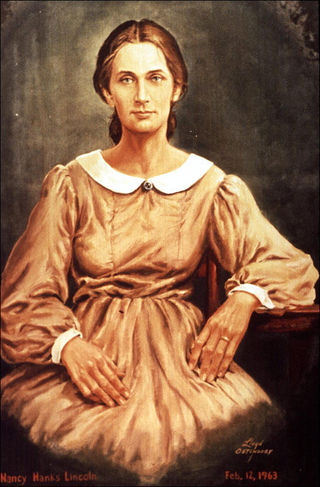JF Ptak Science Books LLC Post 511
 Today is a much-loved day for Abraham Lincoln and Charles Darwin, born within a few hours of one another 200 years ago on this day in 1809. I’m not so sure that we should celebrate them on their birth dates—it has always seemed a bit off to me; perhaps we should celebrate their mothers (Darwin's left, Lincoln's below) instead, leaving another date of importance/accomplishment for the celebration of the birthday boys. Darwin would be an easier pick for this than Lincoln—23 November 1859 being the red-letter day, for the publication of his On the Origin of Species, which is also up for a big 150th anniversary this year. The book was an instant best seller, selling out of the first printing almost immediately (at least for the publishing world of 1859) before going on to a life of its own, with five more editions being published before Darwin was finally sem0through with it (and that in the wake of at least a dozen other influential works to his credit). Lincoln is harder in this respect—there’s Juneteenth, of course, but finding one particular day for his monumental and successful task of not letting the country fizzle away is a bit hazy; perhaps the day of his beautiful second inaugural address, or Gettysburg? Dates like this would make their celebration much more specific, with a great idea in mind, rather than just a foggy celebration of a birth date celebrating the span of a big life. (Also, we combine Lincoln and Washington into a Lincington Day, and barely recognize Darwin at all, unless we’re busy throwing him out of the schools [like, say, in Kansas] to better protect our children from the man with the big white beard. Darwin, not god.)
Today is a much-loved day for Abraham Lincoln and Charles Darwin, born within a few hours of one another 200 years ago on this day in 1809. I’m not so sure that we should celebrate them on their birth dates—it has always seemed a bit off to me; perhaps we should celebrate their mothers (Darwin's left, Lincoln's below) instead, leaving another date of importance/accomplishment for the celebration of the birthday boys. Darwin would be an easier pick for this than Lincoln—23 November 1859 being the red-letter day, for the publication of his On the Origin of Species, which is also up for a big 150th anniversary this year. The book was an instant best seller, selling out of the first printing almost immediately (at least for the publishing world of 1859) before going on to a life of its own, with five more editions being published before Darwin was finally sem0through with it (and that in the wake of at least a dozen other influential works to his credit). Lincoln is harder in this respect—there’s Juneteenth, of course, but finding one particular day for his monumental and successful task of not letting the country fizzle away is a bit hazy; perhaps the day of his beautiful second inaugural address, or Gettysburg? Dates like this would make their celebration much more specific, with a great idea in mind, rather than just a foggy celebration of a birth date celebrating the span of a big life. (Also, we combine Lincoln and Washington into a Lincington Day, and barely recognize Darwin at all, unless we’re busy throwing him out of the schools [like, say, in Kansas] to better protect our children from the man with the big white beard. Darwin, not god.)
23 November seems like a good choice for Mr. Darwin. He did write much else of course, but Natural Selection was his paramount idea. As ideas go, in the entire history of ideas, it is about as good an idea as anyone has ever had—big, muscular, profound, explanative, correct. (There are many big ideas that are harmful but whose idea-ness stretches/breaks the social fabric of societies: the Big Lie, Slavery, Compound Interest, Inferiority, to name a few. I’m not so sure about how good an idea heaven might be.) 
Darwin came to the idea of Natural Selection 20 years* or so before he actually published on it, though there was a chosen circle of friends and correspondents who formed a mesh through which Darwin passed some of his ideas. Listen: I heard a “science” report on NPR this morning talking about why it took “so long” for Darwin to actually publish. And what the science commentator came up with—so far as I could listen—was something about a bubbling god/marriage/love/embarrassment/social debate curative, that Darwin was somehow saving his wife-to-be the retribution of society as Charles did away with the creator. In this porridge of lint I see nothing. Darwin didn’t publish because, for almost all of those years, he wasn’t ready; rather, the theory of natural selection wasn’t ready for presentation. Darwin was still putting together the evidence for his case; and when he was ready, his case was superb. He knew the implications of what he was saying, and he needed to have This Most Beautiful Theory ready, spending 20 years building a castle. He was finally convinced/cajoled into writing a bit about it in 1858 with the young Alfred Russell Wallace (Charles Darwin and Alfred Russell Wallace “On the Tendency of Species to Form Varieties; and on the Perpetuation of Varieties and Species by Natural Means of Selection.” Journal of the Proceedings of the Linnean Society, III, 9, (1858). —a man who like Darwin’s younger self aboard the Beagle in South America made his way around the Malay Archipelago collecting, analyzing, theorizing, until he too came up, independently, with the theory of natural selection. Priority in this case was not in question.
Perhaps we should also recognize the people who were important to the development of the greatnesses of these two men. Speaking to Darwin, there are many, but to make a few examples, we have Thomas Burnet (whose The Theory of the Earth, 1684-90 was the first critical investigation of the implications of geological change, and that in spite of his religiosity and biblical foundations). James Parkinson’s Organic Remains of a Former World, (1804-1811), was an important interpretation of the fossil record albeit with an evolution in favor of god’s continuous actions. Charles Lyell’s Principles of Geology was perhaps the greatest influence on Darwin’s thinking, the young Charles taking a copy of it aboard the Beagle (after being told by friend Henslow not to believe in the book) where it was studied and devoured, being scientifically introduced to the idea of actions over long periods of time.
Seldom mentioned in groups like this, though, is a great scientist and physician, the polymathic Hermann von Helmholtz. This man is principally remembered for experimentally determining what was thought to be impossible—the rate at which the nerves in the body function, and as the inventor of the ophthalmoscope, and as a leading color theorist, and for major contributions to mathematics and physiology, and for his independent discovery of the conservation of energy, the second law of thermodynamics (On the Conservation of Force, 1847). (This is a little problematic, as Joule and Mayer came up with the same thing at about the same time, but the 26-year-old physician figured it out at the same time on his own.) There is much else, but what concerns us here is his Darwin-related bit, an epochal discovery that Darwin must’ve known about—the discovery of the age of the sun, when the sun would expend all of its energy, and then, the age of the universe. These were enormous ideas in 1854—that the impervious sun could actually have a life span, and that by extension so too could the earth and the universe writ large, and that the universe was on the order of hundreds of millions of years old (at least), were shocking revelations. And Helmholtz was more correct than not, giving another verification of massive time that was so necessary to the function of natural selection.
And so I wish good tidings to Mrs. Darwin (Wedgewood), Mrs. Lincoln (Hanks), Alfred Wallace, Charles Lyell, Thomas Burton, and James Parkinson—and also of course to Abraham Lincoln and Charles Darwin.
_______
*Darwin was undoubtedly an evolutionist by 1837, and probably earlier. As Francis Darwin points out that this date may be as early as 1832, pointing out that Darwin, in his Autobiography, wrote:
“During the voyage of the Beagle I had been deeply impressed by discovering in the Pampean formation great fossil animals covered with armour like that on the existing armadillos; secondly, by the manner in which closely allied animals replace one another in proceeding southward over the Continent; and thirdly, by the South American character of most of the productions of the Galapagos archipelago, and more especially by the manner in which they differ slightly on each island of the group; none of the islands appearing to be very ancient in a geological sense. It was evident that such facts as these, as well as many others, could only be explained on the supposition that species gradually become modified; and the subject haunted me.”



"something about a bubbling god/marriage/love/embarrassment/social debate curative ..." I like your explanation better, but some of the above had to be buzzing around like flies the whole time. He knew he needed a big fly swatter.
Posted by: Jeff | 12 February 2009 at 02:26 PM
Right on. You've precisely nailed it--you can't get the Big One with a small swatter. Even with one of the best swatters ever, the flies are still there, bigger and badder as ever.
Posted by: John Ptak | 12 February 2009 at 08:22 PM